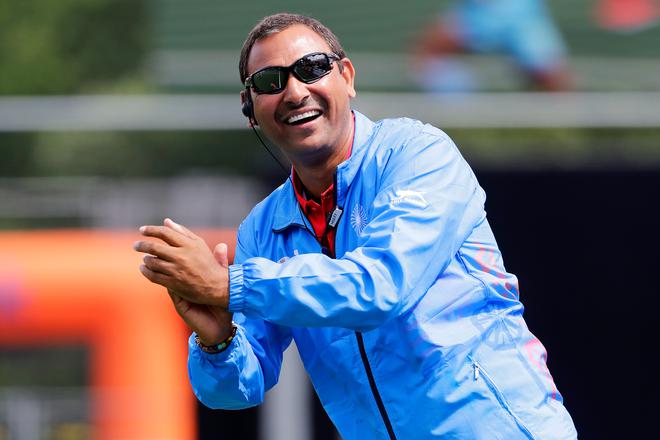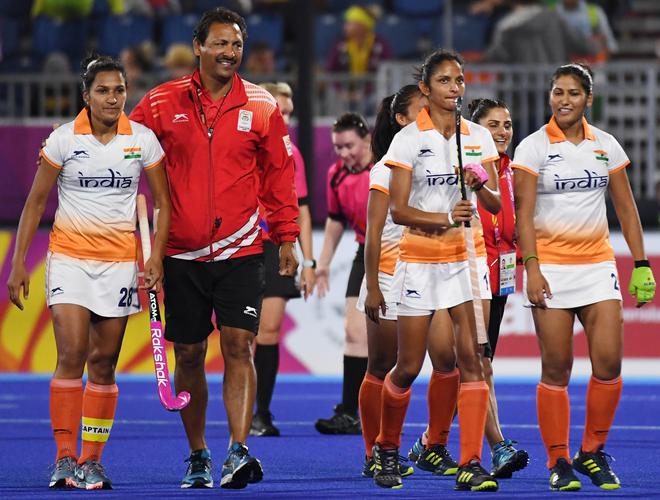Three years ago, Harendra Singh made a life-changing decision. The former India coach, one among a handful of certified master coaches in world hockey and the only one from the country, decided he had had enough of playing second fiddle to foreign appointees at home, refused to compromise on his demands and moved to the USA.
As the chief coach of the USA men’s team, Harendra readily agreed to help the women’s team in its quest for excellence. Its success at the recent Olympic Qualifiers, where it beat India before eventually qualifying for Paris, owed a lot to his inputs, both in terms of planning and player understanding (he was also the India women’s coach for a period). Back in the country for the FIH Pro League, Harendra spoke candidly to The Hindu on a range of subjects. Excerpts:

Three years in professional sport in the USA, how has the experience been?
My experience in India was hands-on. All my practical and theoretical knowledge here was self-generated — why my teams succeeded or failed and how to convert the failures to success. Unfortunately, it began and ended with me. There is no documentation of anything in India.
There is always talk of doing it but on ground, I think less than 0.001 percent work has been done. We are only depending on a player’s skills and natural aptitude for medals. Scientifically and in the use of technology and research, we are far behind. I believe we have the potential to be in the top five at any major event, including the Olympics, but not without the back-room work.
When I become coach here, I have nothing to know what the previous coach did. And when I leave, the next coach won’t have any official documentation or data.
This has been my biggest learning experience in the USA. There is proper documentation at every step, data is available and you have to keep adding to it. I think proper documentation is very important for any organisation to have a proper system and for that system to work effortlessly.
Let me give an example. If I need to know about a particular player, I have everything about him, over the years, in front of me — what his speed is, whether he is more injury prone and in which part, his physiology, what needs to be done, how it is to be done, who will work on what aspect of the player. I think this is a big reason for the USA being on top of the medals table in terms of golds at every Olympics.
And not just at the top level on field; even at the grassroots, a coach there will not have to start from zero. He will know the mindset of a player, his problems in specific situations, his social and financial background, the kind of student he has been at school or university, his ambitions and what he hopes to achieve through either sports or academics. The use of science to know and improve there is way ahead.
How would you compare it to coaching in India?
In the use of science we are far behind although I believe, from my experience, that Hockey India and our players are still way ahead of all other Olympic sports and, in some areas, even the BCCI. But that is limited to the top. Across the country, players still don’t know about biomechanics, physiology, periodisation (a cyclical method of planning and managing training through the year divided into phases focusing on different goals), tempering or transition period.
Which is why our players take time to adapt when they come into the national set-up. It takes at least a year to get used to all of this and if he fails in that period, he risks being discarded. A player is the most important person for a team to succeed and if you don’t discuss all this with him he cannot perform. You need to give him a specific deliverable and a pathway to reach there.
How do you see the Indian team’s development in recent years and the road ahead?
I believe this team has given good results between 2016 and the Tokyo Olympics. We are on top in Asia and at least for the next five years, I don’t see any team challenging it. Having said that, top-level hockey is now limited to India, Australia and four Euro teams — Belgium, Germany, Netherlands, England — with Argentina as an outlier. Against these, we have a lot of work to do.
I feel Craig [Fulton] is a good coach and is doing well but the team remains unpredictable. Who makes what decision on the field at what moment is still not certain, there is a fragility in mind that mirrors on field. When they maintain their structure, they are brilliant and unbeatable. Talent-wise, there is depth for now. But I am sceptical about the future groups for the ’28, ’32, ’36 Olympics, I cannot see those players at the moment.
What do you feel is the solution?
The solution is not with the national team, you need to find it at the domestic level with Indian coaches taking modern learning to the grassroots. Sadly, only a few in India take any interest and even they are not bothered about holistic learning. Skill is just one part, there are other subjects — nutrition, biomechanics, physiology, mental health, injury prevention, strength & conditioning — I don’t think there is a single coach in India who is willing or able to discuss these topics. Even if someone does, it is in a specific context. A player coming with these handicaps into the national camp is like a kid thrown into the ocean without training asked to save himself.
I think it is time for the government, the federation and the IOA to be on a single platform and use it to provide facilities and create a pathway for players and coaches. The IOA needs to be a lot more involved, there has to be exchange of ideas. If we are bidding for the 2036 Olympics, this is the right time to bring in radical changes. There is a lot of talk and no execution.
Germany coach Valentin Altenburg spoke about legacy inspiring confidence. We have a hockey legacy bigger than anyone else but that hasn’t translated into results.
Altenburg has been part of a legacy-creating team at Rio so he knows what he is saying. But I believe any team can create a legacy when you work on three things — passing, receiving and tackling. If these are good in your players, the confidence level automatically goes up. If you are 1-0 down with minutes to go but confident in these areas, you know there will be a moment when one good pass will turn into a goal. When that moment doesn’t come, it becomes chaos. The problem is, we don’t make things happen, we wait for things to happen.
We talk about legacy but it is useful when you learn from the past. I suggest ‘Legacy’ by James Kerr on the NZ rugby team to understand the actual idea of legacy. Our eight golds were great but who saw them happen? If today I have to use that to teach the Indian team, how do I explain or show them practically? Again, no data, no video to make them believe and continue the legacy.

If we talk about the women’s team, is it disappointing to see them not qualify for the Olympics and is there a conflict when the USA plays India?
Of course you feel bad when your country’s team, where you have worked in the sport for 25 years, doesn’t qualify. But I also felt good for the USA. They had missed out on Tokyo after losing to India here and I could see there was a desire to change that. Credit to the federation and specially coach David Passmore to prepare the team. I know for a fact that the moment the qualifiers were decided, the entire USA Hockey got together to make it possible. The target here is 2028 in LA, Paris is a preparatory stop. But I still think the Indian women’s team deserved to be in the Olympics and has a better chance of winning medals compared to men.
When I took charge of the women’s team, I had only one regret — coming in so late. All credit to coach Baldev Singh who pestered me for almost five years but I did not take him seriously. But when I took charge, I realised the satisfaction a coach feels in terms of actually developing players is with the women’s team. If you demand something, they deliver. We have the talent but we need to get it clicking at the right time and place. In speed we are level with the top teams, strength is less yes but that is made up for in agility. Our girls are emotional but we need to make it their strength, not weakness.
Can you list a few specific reasons for the women’s team’s failure?
One, coaches have ignored the drag-flick and continue to do so. If the men are today among the top teams, a big reason is Harmanpreet and there is a big group as back-up. Unless that happens in women, it will be difficult to turn losses into wins. Two, the inability to be present in the moment inside the attacking 25-yard circle and allowing too much space to the opponents inside that zone defensively is a big concern.
Finally, can we see you back in India as a coach?
Coaches are professionals, no doors are ever permanently closed or opened for them. It all depends on demand and supply from both ends. For now, I am very happy working with USA [Field] Hockey and its board members, the High Performance programme, I am fortunate to be working with them under their vision. I don’t know if I have been successful in giving something but I know there was a big chunk missing from my coaching life and here I have got a lot — enough for the FIH to include me in the panel of the world’s top seven coaches. So it’s good.







